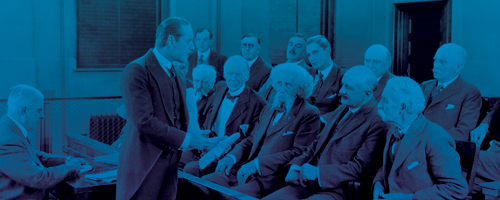I represent some bad people. It is what I do for a living. And I love it. Don’t get me wrong; I also serve good people, decent individuals who have made mistakes, who suffer from addiction, who have lashed out in anger or frustration. But the best part of my job involves the worst part of our society. I have been counsel to violent criminals: burglars, drug dealers, rapists, and several murderers. I am often asked, “How can you defend these people?”
The answer illustrates one of the fundamental principles of our system and our nation. A system in which the government is restrained by its citizens.
The first ten Amendments to the United States Constitution are remarkable in that they were drafted as restrictions on government action. Strictly speaking, the Bill of Rights does not grant you anything. It was intended to shackle the government, to prohibit the government from interfering with rights naturally possessed by all.
For example, the First Amendment does not grant you the right to free speech or the freedom to practice your religion. It prohibits the government from interfering with these freedoms that all Americans have as their birthright.
Imagine if the right to an attorney and the right to challenge the government could be taken away from a citizen, based only on the seriousness of the allegations the government made against him. How quickly would the government learn to lodge the most grievous charges against the most vulnerable among us? The worst crimes imaginable do not deprive a person of their rights in our system of justice. The most reprehensible criminal is not stripped of his rights. Those rights are ensured to each of us precisely because they are guaranteed to all of us.
When the government tries to (or does) curtail, eliminate, or restrict your rights, there are checks and balances designed to push back against government action. The most effective of these controls on the government’s abuse is a private citizen with training in the law and a willingness to use that training to confront the government. When the government puts an unfair thumb on the scales of justice, a good attorney will not hesitate to put her thumb in the government’s eye. Our system allows this, even encourages it, because of the fear of that poke in the eye, the fear of the resistance of citizens, works to keep the government honest… for the most part.
If this ability to confront the government were eliminated, the government would run unchecked in any direction a leader might choose. History is filled with horrible examples of just this phenomenon. The rights you take for granted today would be eroded over time or simply erased overnight.
Part of what makes this system work is our judiciary; it allows and encourages challenges to the government. If and when they do their job faithfully, Judges assist in reigning in the worst excesses of government. But the real work is done by those lawyers who represent the worst offenders. Protecting against a systemic abandonment of the rights of the worst criminals guarantees the continued existence of a system that holds the government accountable every day.
So, before you enter your anonymous online comments, calling a criminal defense attorney a lowlife, degenerate, pond scum, idiot, poncy twit, or worse… Take a minute to reflect on what the government might do to you and your loved ones if there was no one to push back, no one to question an injustice, and no one to poke a thumb in the government’s eye when necessary.
You enjoy the rights that are fought for in our courts by our criminal defense attorneys. You live under the best system ever devised for balancing individual liberty with the best interest of the community. You prosper because citizens can, and do, challenge the government and force it to be more just. This system did not develop by chance. Our Founding Fathers intentionally created it, and it is fostered by those who understand their original intent. The job of a criminal defense attorney is vital to our system of justice. So, when you ask me how I can defend those people, you are really asking me how I can protect you and your rights; how I can defend our system of justice. That is a question that should not need to be answered.






















